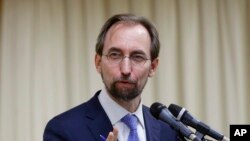The United Nations released a report Wednesday saying Sri Lanka cannot rely on its own justice system and instead should use a special court to achieve accountability for violations that took place during the country's 26-year civil war.
The recommendation came as part of a report on what the U.N. Human Rights office said were possible war crimes and crimes against humanity during the conflict that pitted government forces against rebels seeking independence for the nation's Tamil minority. The fighting killed up to 100,000 people, according to widely accepted estimates.
“The report lays bare the horrific level of violations and abuses including the indiscriminate shelling, extrajudicial killings and enforced disappearances," explained U.N. High Commissioner for Human Rights, Zeid Ra’ad Al Hussein. "It contains harrowing accounts of torture and sexual violence. It also covers the recruitment of children by the LTTE (Liberation Tigers of Tamil Elam) and paramilitary groups.”
Sri Lanka, the report said, should look to the way other countries have used international judges, prosecutors, lawyers and investigators.
"A purely domestic court procedure will have no chance of overcoming widespread and justifiable suspicions fueled by decades of violations, malpractice and broken promises," Hussein said.
Remaining obstacles
The report praised Sri Lanka's new government for its stated commitment to seek accountability, but detailed multiple obstacles such as what it said is the lack of a reliable system to protect victims and witnesses.
"The security forces, police and intelligence services have enjoyed near total impunity and have not undergone any significant downsizing or reform since the armed conflict," the report said. "The military retains an oppressive presence in the war-affected areas of the north and east, still occupying extensive private land, expanding into commercial economic activities, and maintaining a culture of surveillance and harassment of the local population and civil society."
Reuters quoted a Sri Lankan Foreign Ministry statement saying the government "will ensure dialogue and wide consultations with all stakeholders" while putting in place measures to ensure justice and achieve reconciliation and peace.
The government of previous leader Mahinda Rajapaska rejected any international investigation into allegations of possible war crimes during the conflict. An earlier U.N. report estimated at least 40,000 people died during the final months of the war in early 2009, and that most of those casualties were on the Tamil side.
War crime allegations
Wednesday's report said there appears to be sufficient evidence of extrajudicial killings of Tamil fighters. The U.N. investigation also documented what the report called the "brutal use of torture" by Sri Lankan forces, particularly following the conflict when former Tamil fighters and civilians "were detained en masse."
The report said there are grounds to believe government forces carried out arbitrary arrests and widespread rape. The U.N. also believes Sri Lankan forces and pro-government paramilitary fighters were involved in widespread unlawful killings of civilians, particularly Tamil politicians, humanitarian workers and journalists.
The Tamils, the report said, showed a pattern of abduction and forced recruitment as well as the recruitment of child fighters, both of which accelerated toward the end of the conflict. It also said there are grounds to believe Tamil fighters killed Tamil, Muslim and Sinhalese civilians who did not support the group, and put military fortifications next to civilian areas that exposed people nearby to danger.
Lisa Schlein contributed to this report from Geneva




